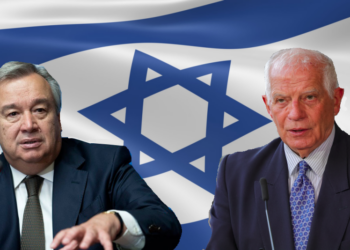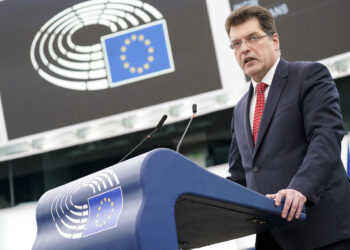Brussels – Israel has gone too far, and continuing to support the government and its leader, Benjamin Netanyahu, is becoming difficult. The European Union is distancing itself from the way the Jewish state is managing the response to the Oct. 7 Hamas attacks and is beginning to ditch the Israeli leadership. The European Parliament’s plenary debate on the situation in Gaza registers harsh tones from the Commission and from many MEPs, who from every political group censure a situation seen as increasingly untenable.
European Commission President Ursula von der Leyen begins by condemning Netanyahu’s actions without, however, ever quoting him directly. In publicly denouncing that “the situation on the ground is more dramatic than ever and has reached a tipping point,” von der Leyen attacks the Jewish state. “We have all seen the reports of children dying of starvation. This cannot be.” She indirectly blames the Israeli government when she points out that “everyone knows how difficult it is to move aid in and out of Gaza.” A clear rebuke.
On the EU side, she guaranteed all possible support. She announced the activation of the European Union Civil Protection Mechanism, inviting EU member states to participate. She confirmed full support for the humanitarian corridor by sea announced last weekend, and in that sense, “we will finance and coordinate the flow of European goods through the corridor.” The situation, von der Leyen continued, “makes it even more important to work with those agencies that still have a presence on the ground. And this is the case with UNRWA,” the UN agency for Palestinian refugees that Israel would like to delegitimize and isolate after allegations of officials involved in the Hamas attack: an emphasis that marks the distance between the EU and Israel.
But it is in the European Parliament where perhaps there is the most severe rift. Critical voices are rising from all the main groups: popular (EPP), socialists (S&D), liberals (RE), Greens, and the Radical Left. Exponents of all these forces are expressing harsh words, not necessarily the positions of the entire group, but they are high-level personalities speaking out, testifying to the widespread discontent. The most direct is the Socialists’ group leader, Iratxe Garcia Perez, who speaks openly of a “massacre of Palestinians by Netanyahu,” in the face of which “we must send a clear signal,” calling for “an end to his impunity.” As the EU, she continues, “We must prevent Palestinians from being overwhelmed by the apartheid regime established by Netanyahu.”
Also going down hard is Juan Fernando Lopez Aguilar (S&D), president of the Committee on Civil Liberties: “Netanyahu is preventing overland access to humanitarian aid,” he denounced. “This brutality committed against the people of Gaza exceeds the legitimate right of self-defense and international law.” Then the lunge: those responsible “must be punished.” A clear indictment of the government in Tel Aviv.
From the ranks of the EPP, Ireland’s Sean Kelly called for “a stop to Netanyahu‘s killing of innocent people in Gaza” and “a ceasefire.” Words that contrast with those of von der Leyen, who in the House argued instead for “a humanitarian pause.” The debate, therefore, also shows different views within the EPP.
Without such vehement accusations, even liberals ditch what was once an unconditional partner. “We have lost all hope in Netanyahu and Israel,” chimes Georgos Kyrtsos of Greece, who does not see the current ruling class as reliable for the peace process and a two-state solution. Valery Hayer, president of Renew Europe, calls for a “ceasefire for humanitarian reasons.” Again, a ceasefire instead of a humanitarian pause as proof of the unsustainability of a situation that is no longer tenable. Jordì Sole of the Greens, also critical of the deterioration in Gaza, joined the call.
From the benches of The Left, the tones get even harsher. Jao Pimenta Lopes accuses Israel of “genocide in Gaza,” calling on the EU to withdraw support and backing for the Jewish state. “The situation is embarrassing, and we should stop being complicit.” The House debate seems to suggest that regardless of how the confrontation between Israel and Hamas ends, the Jewish state has already lost this conflict in terms of public support and political backing.
English version by the Translation Service of Withub







